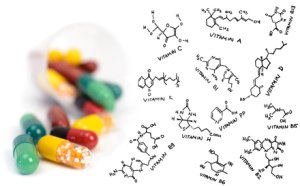Is your multivitamin of good quality or are you just wasting money?
 Many people take a multivitamin this time of year. However, even if the manufacturers really squeeze together the ingredients it is impossible to put enough vitamins and minerals in one pill to cover our actual needs. In fact, the manufacturing process determines if we are able to absorb the different nutrients in the first place, and that is important for them to work properly in the body. Therefore, it is vital that you choose a supplement that has good quality, and you must make sure to focus on the vitamins, minerals, and essential fatty acids that we humans typically tend to lack.
Many people take a multivitamin this time of year. However, even if the manufacturers really squeeze together the ingredients it is impossible to put enough vitamins and minerals in one pill to cover our actual needs. In fact, the manufacturing process determines if we are able to absorb the different nutrients in the first place, and that is important for them to work properly in the body. Therefore, it is vital that you choose a supplement that has good quality, and you must make sure to focus on the vitamins, minerals, and essential fatty acids that we humans typically tend to lack.
The official dietary guidelines are supposed to provide us humans with nutrients that we need, but many people do not even follow these guidelines. Even if you eat a healthy diet, there are factors involved that may cause deficiencies of specific vitamins, minerals, and essential fatty acids. For instance, nutrient-depleted soil, refining of food, lack of sunlight, stress, disease, anemia and menstrual bleeding, high-performance sport, and ageing can drain the body of vital nutrients.
The official recommendations do not take these differences into account. The DRI (Daily Reference Intake) is the same for someone who is tall or short, healthy or diseased, stressed out or relaxed etc. Therefore, even if your nutritional supplement declares that the content of a given nutrient is 100% of the DRI, this is no guarantee that you are getting what you actually need.
The most common vitamin, mineral, and fatty acid deficiencies
American and British studies reveal that the majority of people fail to get enough vitamins, minerals, and essential fatty acids from their diets. The most common deficiencies are seen with vitamin D, vitamin C, magnesium, calcium, selenium, and iron. Even with daily consumption of a multivitamin, there are widespread deficiencies and that may be explained by three factors:
- The nutritional content is too limited (typically vitamin D, calcium, and magnesium)
- The quality is poor so the nutrients fail to get absorbed
- The product does not contain vital nutrients like potassium and vitamin K2
The diet and the quality of supplements are important
It is undoubtedly always best to eat a healthy and balanced diet where you get the essential vitamins and minerals in a natural and organic form together with fiber and other nutrients that give a synergy effect when combined. As there are vast quality differences from one nutritional supplement to another, one should generally always be aware of the following:
- The vitamins and minerals (in particular) must ideally be organic and in a form which the body can absorb, and which the cells can utilize
- The supplement must be manufacturer by a reputable company
- The manufacturer must possess extensive knowledge and have experience with the proper manufacturing techniques
- The manufacturer must document that the nutritional supplement contains the right nutrients and make sure that the nutritional value is not decreased during the manufacturing process
- The packaging must ensure that oxygen, heat, and light are not able to destroy the nutrients. This is possible with help from e.g. blister packs
It is a huge advantage if the manufacturer has tested his products in human studies - Just because one product is documented in studies, it is no guarantee that similar products have the same effect
Unfortunately, the strict legislation for nutritional supplements limits the possibility of using health claims, which makes it difficult for the consumer to know what different supplements are actually good for. At www.healthandscience.eu you can read more about all the extensive research in vitamins, minerals, and essential fatty acids.
Economizing with your nutrients and the danger of long-term deficienciesVitamins and minerals are essential micronutrients that are involved in thousands of enzyme processes where macronutrients (carbohydrate, fat, and protein) get converted into energy, which all our cells need to handle their special tasks. In the case of relative lack of one or several micronutrients, the body gives first priority to its energy turnover and vital organs. At the same time, however, there is a risk that there are not enough micronutrients for those functions that protect cells, tissue, and the cardiovascular system. In time, this increases the risk of infections, hormone imbalances, rheumatism, blood clots, cancer, and other diseases. |
References:
http://articles.mercola.com/sites/articles/archive/2016/11/16/vitamin-mineral-deficiencies.aspx
https://www.ncbi.nlm.nih.gov/pubmed/24724766
https://medtechboston.medstro.com/blog/2016/07/26/vitamins-and-minerals-what-are-americans-missing-part-3-of-a-3-part-series-clone/
http://www.motherearthnews.com/natural-health/nutrition/nutrient-deficiency-zm0z13jjzmat?pageid=4#PageContent4
Pernille Lund: Sund og Smuk – hele livet. Ny Videnskab 2016
Search for more information...
- Created on .








